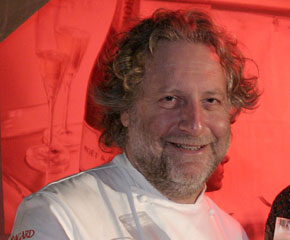The former professional musician was selling Ferraris in his native California when a friend, aware of his fondness for eating in restaurants, suggested Waxman enrol in a local cooking class. It was good advice that changed Waxman’s life.
“That’s where it all kind of happened,” he said in an interview.
The class led to a stint at the La Varenne cooking school in Paris in 1976 and exposure to what he describes as the precision, control and impeccable ingredients that are characteristic of French cuisine.
Waxman described his ‘less is more’ philosophy of cooking at his restaurants in New York, California and Guadeloupe, and revealed some of his favourite recipes in his book A Great American Cook.
Q: The ethos of the book is not so much professional recipes but how you cook for yourself, is that right?
A: “Exactly. And interestingly enough it is kind of the philosophy I have in the restaurant as well, to keep things simple. Don’t try to complicate things. It doesn’t mean to forget about things using guinea fowl or venison or things that might be slightly exotic to the daily palate, but it means to do it in a way that would be enjoyable for the home cook.”
Q: You were a professional musician, a trombone player, at one point. What made you decide to be a chef?
A: “In the early 70s when I was a musician the earning was fantastic, but in about 1973 or 1974 with the advent of disco there was no market for live musicians. It just totally dried up. There were a lot of trombone players out there and not a lot of gigs.”
Q: Did you always want to be a chef?
A: “No. I never even thought about it. I was very lucky because both my parents were really good cooks and loved food. They dragged me to restaurants from the time I was an infant. I grew up in San Francisco, in Berkeley, and I went to lots of different restaurants and I really enjoyed it.”
Q: Where did the “less is more” philosophy come from?
A: “It came from my background and growing up – doing things over the barbecue, more of a California style. Eating Japanese food, eating Mexican food and eating foods from different cultures that were simpler in a lot of ways than French food. I sort of use French techniques and French sensibilities but think about different ways of doing it. When I went to Italy too, that really shook my boots.”
Q: How would you describe your style of cooking?
A: “Well everybody says I’m the California cook. What does that means? Well, California has Mediterranean sensibility coupled with ingredients that are indigenous to many parts of the world but also an open mindedness to everything – an ability to be able to use wok technique with French ingredients.”
Q: What advice would you give to people who want to improve their cooking?
A: “Number 1 is don’t be afraid to make a mistake. Number 2 is to shop first and then look at the recipe second, which I think is really important. At our produce and farmers’ markets and different grocery stores, that is where the real revolution is. These farmers, ranchers and fishermen are offering things that when I first started didn’t exist… I would rather go to the market and pick stuff first and then bring it home and cook it. That is where I’m at. I think that is my overriding philosophy about how to cook.”

